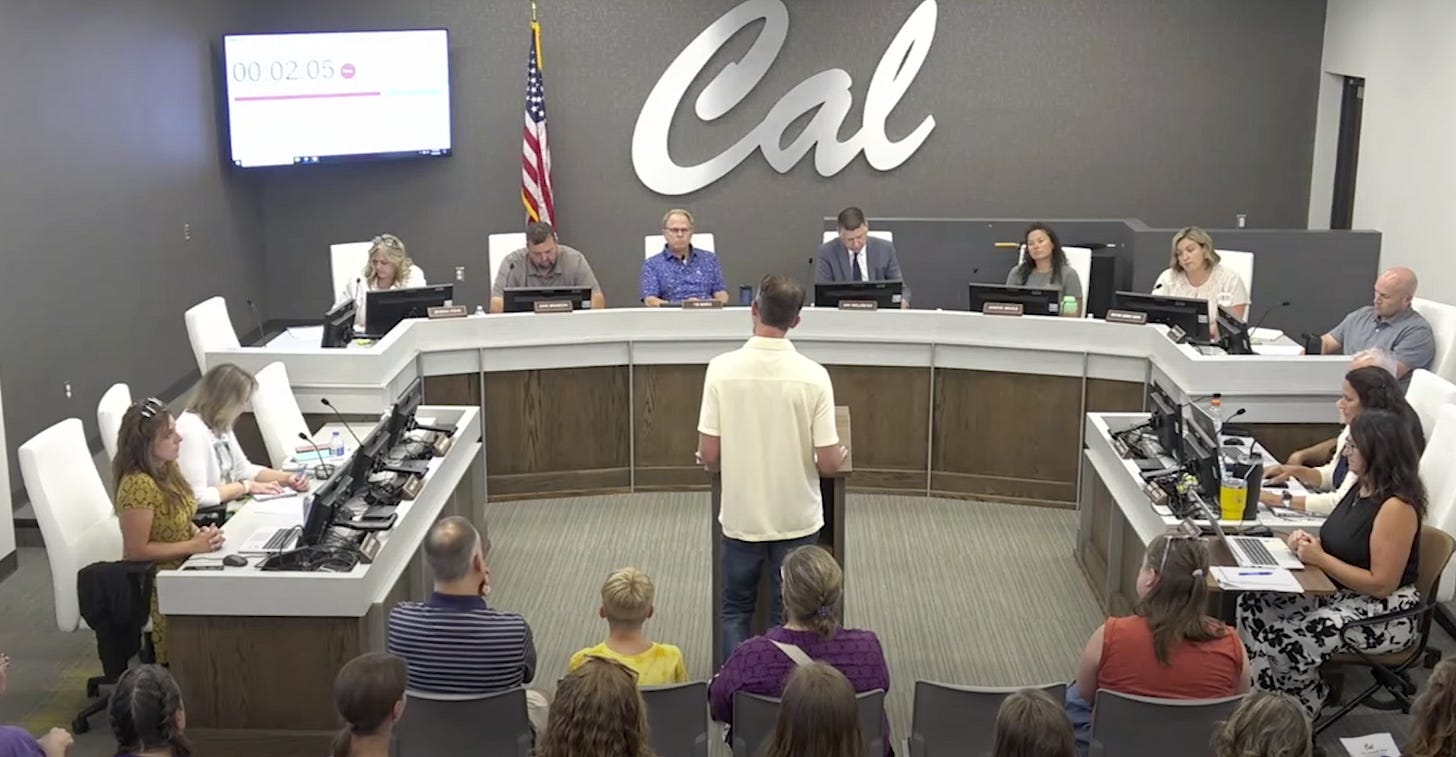My School Board Script About Phones, Chromebooks, and AI
I stand ready to help my district chart a better digital path forward.
My sons attend an amazing rural public school that provides an excellent education. We moved here partially because of the schools.
Like most districts, there are opportunities to improve how our school handles personal electronics, technology in education (EdTech), and AI in the classroom.
I suspect others who read this also have concerns about these issues in their schools. I always promote a collaborative approach with school leadership until it has been fully exhausted. That’s my commitment to my board as we move forward. And I was pleased with their response to my public comments. Multiple board members approached me after the meeting, curious to learn more.
My full 3-minute script is below, and also here as a Google Doc that you can download and edit. It’s very customizable for your district.
Hello, I’m Chris McKenna. Andrea and I are the proud parents of 4 Fighting Scots ages 13-20.
Professionally, I’m the founder of Protect Young Eyes, a nationally recognized digital safety organization. I’ve spoken globally from the World Economic Forum in Switzerland to Capitol Hill about the impacts of social media, educational technology, and AI on childhood.
I am here today with 3 specific requests:
Remove personal electronics from passing and cafeteria time in the high school.
Pass a resolution that encourages responsible and limited screen time in classrooms (inspired by Burke County, NC).
Allow parents to opt in to all uses of AI in the classroom.
First, remove personal electronic devices from passing and cafeteria time in the high school. You might remember a similar request from Jill Thompson last month. We already have strong, consistently enforced bell-to-bell policies in grades K-8, especially in Duncan Lake. Why not continue this approach in high school?
A Common Sense Media study showed that 41% of teens have viewed pornography during the school day. Another study from the University of California showed it takes over 23 minutes to refocus after checking a smartphone.
Because of the work of my friend, Dr. Jonathan Haidt, entire countries, US states, and thousands of schools have made the bold and common-sense decision to remove access to personal electronics from the school day.
Every school that implements this approach experiences benefits, including shifts in behavior, improved grades, decreases in cyberbullying, and, according to multiple schools, “laughter and conversation in the cafeteria, again.”
Second, pass a resolution that encourages responsible and limited screen time in education, unless it offers clear, evidence-based advantages.
Every parent I’ve spoken to about the use of Google Classroom and Chromebooks in Cal Schools wishes they were used less.
According to a study by Internet Safety Labs, 96% of tech used in classrooms was selling student data. A Science Direct report found that 38 of every 60 minutes spent on school laptops was off task. During a conversation with a teacher during conferences last year, I was told that one of my sons was sometimes distracted while using his Chromebook.
I smiled. I then imagined my 1990s history book with 25% of its pages being about baseball, porn, and video games, and Mr. Courser, my middle school history teacher, getting upset when I was distracted. Our current approach to technology in the classroom demands re-evaluation.
Finally, allow parents to opt in to all uses of AI in the classroom. In May, SchoolGPT was tricked into giving a Forbes investigator step-by-step instructions for manufacturing fentanyl and date rape drugs.
Last week, while using ChatGPT, a reporter from The Atlantic was told “Hail Satan,” and was encouraged to cut her wrists by finding a “sterile or very clean razor blade. You can do this!” the chatbot said.
Without teacher training, student literacy, and considerations for privacy, protection, and parental rights, all AI should be opt-in.
In closing, our Cal Schools' mission is: “Empower and equip all persons to achieve their best by ensuring the highest quality system for learning.” I invite the Board to ask if our current approaches to personal electronics, Ed Tech, and AI support this mission.
I know your list of priorities this fall is long and onerous. I stand ready to collaborate with you on these critical issues, including making changes to the handbook, which is on your agenda tonight.
Thank you.




Way to go! Do you have a script to read to youth pastors or social media/communication directors in large churches?
This will be in the hands of the chair of the school board for Arlington Public Schools tomorrow. Thanks for sharing!